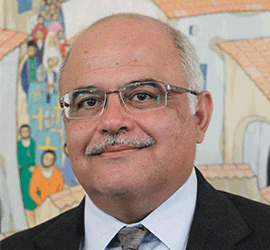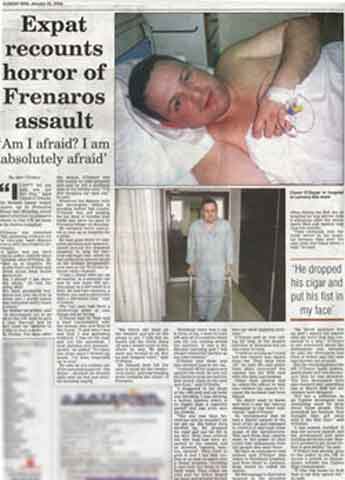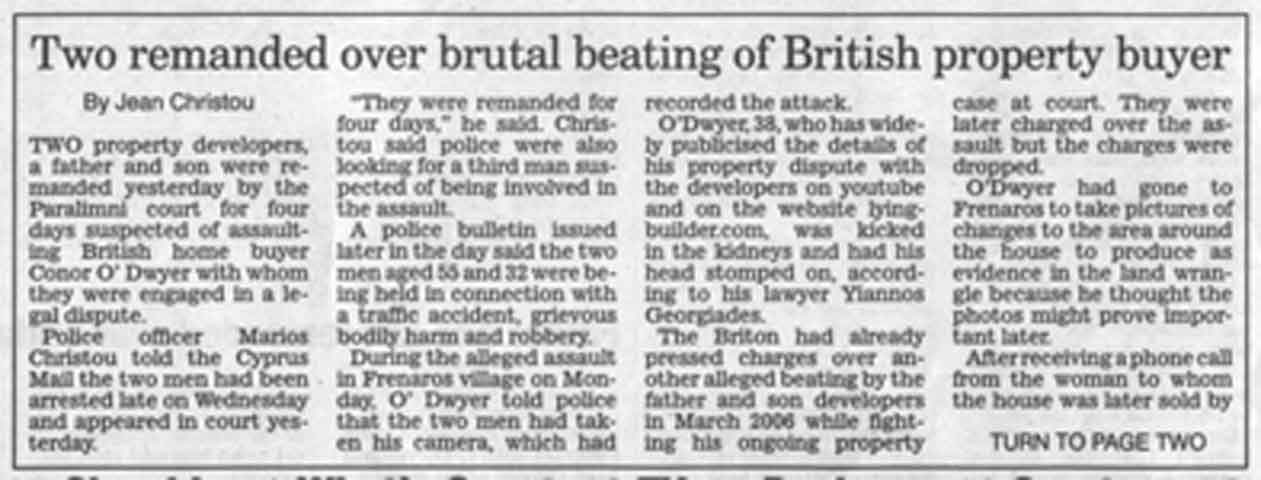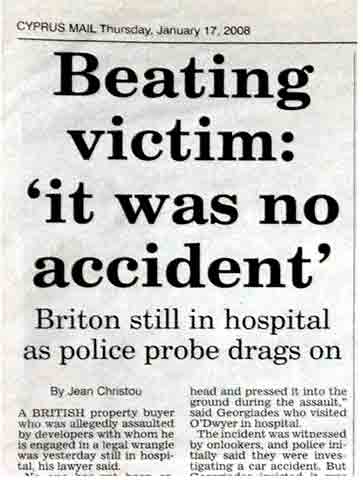ΕΠΑΡΧΙΑΚΟ ΔΙΚΑΣΤΗΡΙΟ ΑΜΜΟΧΩΣΤΟΥ
ΕΝΩΠΙΟΝ: Τ. Θ. Οικονόμου, Π.Ε.Δ.
Αρ. Αγωγής: 927/07
Μεταξύ
Christoforos Karayiannas & Sons Ltd
Εναγόντων
-και-
Cornelius Desmond O’Dwyer
Εναγομένου
Αίτηση για αναστολή ή παραμερισμό της διαδικασίας, ημερ. 11/2/08.
Ημερομηνία: 20 Μαρτίου, 2008
Εμφανίσεις:
Για τον Εναγόμενο – Αιτητή: κα Ραφαήλ για Γεωργιάδη και Μυλωνά
Για τους Ενάγοντες – Καθ’ ων η Αίτηση: κ. Κλαϊδης με τον κο Φλουρέντζου
Παρών ως δ/ντης των εναγόντων ο κ. Χρ. Καραγιαννάς.
ΑΠΟΦΑΣΗ
Οι ενάγοντες ζητούν αποζημιώσεις και διατάγματα σε σχέση με κατ’ ισχυρισμό δυσφήμιση τους από τον εναγόμενο «δια των ιστοσελίδων και/ή ιστοχώρων» στο διαδίκτυο «υπό τον τίτλο» www.lyingbuilder.com και www.youtube. Δεν έχει ακόμα καταχωριστεί έκθεση απαίτησης. Η εκδοχή των εναγόντων φαίνεται σε ένορκες δηλώσεις του διευθυντή τους Μάριου Χ. Καραγιαννά, που συνοδεύουν αίτηση τους ημερ. 20/12/07 για ενδιάμεσο απαγορευτικό διάταγμα και ένσταση τους ημερ. 25/2/08 σε αίτηση του εναγομένου για αναστολή ή παραμερισμό της διαδικασίας.
΄Ολα ξεκίνησαν όταν ο εναγόμενος και η σύζυγος του συμφώνησαν στις 23/8/05 να αγοράσουν από τους ενάγοντες μια κατοικία στο Φρέναρος. Προέκυψε διαφορά στα πλαίσια της οποίας ο εναγόμενος κατηγορεί τους ενάγοντες για ψευδείς παραστάσεις και οι ενάγοντες κατηγορούν την άλλη πλευρά για διάρρηξη της σύμβασης. Ο εναγόμενος έχει κοινοποιήσει τις κατηγορίες του αυτές στο διαδίκτυο, μαζί με περαιτέρω κατηγορίες για την διάπραξη από τον εν λόγω διευθυντή και τον πατέρα του, επίθεσης και άλλων ποινικών αδικημάτων εναντίον του. Παράλληλα διακηρύττει ότι δεν φοβάται τον λίβελο επικαλούμενος την αλήθεια των ισχυρισμών του.
΄Εχει ακουστεί αίτηση του εναγομένου για αναστολή ή παραμερισμό της διαδικασίας επί της θέσης ότι το παρόν δικαστήριο στερείται δικαιοδοσίας ή ότι πιο κατάλληλο και πρόσφορο forum αποτελούν τα αγγλικά δικαστήρια. Μετά την κατάθεση των γραπτών αγορεύσεων, η ευπαίδευτη δικηγόρος του εναγομένου έθεσε θέμα κατάχρησης της διαδικασίας επειδή εκκρεμεί η αγωγή 365/06 «μεταξύ των ιδίων προσώπων σε σχέση με την ίδια δυσφήμιση και τα ίδια γεγονότα». Το θέμα προέκυψε από την αναφορά που οι ίδιοι οι ενάγοντες κάμνουν στην εν λόγω ένορκη δήλωση του κ. Μ. Καραγιαννά, στην οποία επισυνάπτουν ως τεκμήριο την έκθεση απαίτησης στην αγωγή 365/06. Η αγωγή 365/06, όπως είναι κοινώς δεκτό, συνεχίζει να εκκρεμεί. ΄Εχει μάλιστα τεθεί εκ συμφώνου ο φάκελος ενώπιον του δικαστηρίου για τους σκοπούς του παρόντος ζητήματος.
Το δικαστήριο σημείωσε ότι το θέμα κατάχρησης μπορεί να εγερθεί και αυτεπάγγελτα και χωρίς ιδιαίτερη διαδικασία. Αρκεί να βρίσκονται ενώπιον του τα απαιτούμενα δεδομένα. Σημείωσε επίσης ότι η παρούσα αγωγή φαίνεται εκ πρώτης όψεως να έχει το ίδιο αντικείμενο και να αφορά το ίδιο υπόβαθρο γεγονότων όπως η αγωγή 365/06. ΄Ετσι κάλεσε τις δύο πλευρές να αγορεύσουν επί του θέματος πριν προχωρήσει περαιτέρω η διαδικασία.
Ο ευπαίδευτος δικηγόρος των εναγόντων τοποθετήθηκε επί του ερωτήματος χωρίς να εγείρει ζήτημα ότι είναι πρόωρο για τον λόγο ότι δεν έχει ακόμα καταχωριστεί έκθεση απαίτησης. Αυτό το ζήτημα, εν πάση περιπτώσει, με έχει απασχολήσει, εφόσον τα επίδικα θέματα προσδιορίζονται από τις έγγραφες προτάσεις. Η αρχή, όταν εξετάζεται θέμα δικαιοδοσίας, είναι ότι η αποκλειστική πηγή αναζήτησης των γεγονότων που στοιχειοθετούν την δικαιοδοσία είναι η έκθεση απαίτησης (Μούρτζινος v. Global Cruises Ltd (1992) 1 Α.Α.Δ. 1160). Θα μπορούσε να ισχύει αναλογικά η ίδια αρχή και όταν εξετάζεται ζήτημα κατάχρησης; Αλλά, ακόμα και έτσι, η αρχή της Μούρτζινος δεν έχει εφαρμογή όταν τα αναγκαία και επαρκή στοιχεία για να είναι δυνατή η εξέταση του ζητήματος βρίσκονται ενώπιον του δικαστηρίου ήδη πριν από την έκθεση απαίτησης (Παπακοκκίνου v. Landbroke PLC κ.ά. (1999) 1 Α.Α.Δ. 838). Εν προκειμένω, πέραν της γενικής οπισθογράφησης που δεν συγκεκριμενοποιεί τα παράπονα των εναγόντων, η εκδοχή τους έχει αναλυτικά τεθεί με την εν λόγω ένορκη δήλωση του κ. Μ. Καραγιαννά ημερ. 20/12/07, ο οποίος αναφερόμενος στα γεγονότα παραπέμπει στην αγωγή 365/06 επισυνάπτοντας, όπως ήδη ελέχθη, την έκθεση απαίτησης. Τα ήδη ενώπιον του δικαστηρίου δεδομένα επαρκούν ώστε να τεθεί και να εξεταστεί ζήτημα κατάχρησης σε σχέση με την ύπαρξη της άλλης αγωγής. Υπ’ αυτές τις περιστάσεις το ζήτημα πρέπει να εξεταστεί τώρα και όχι να εξαρτηθεί από την καταχώρηση στο μέλλον έκθεσης απαίτησης, η καταχώρηση της οποίας εκκρεμεί για μήνες, με αποτέλεσμα να συνεχίζονται στο μεταξύ οι διαδικασίες σε μια αγωγή που στο τέλος μπορεί να αποδειχθεί καταχρηστική. ΄Ηδη, εκτός από αίτηση για αναστολή ή παραμερισμό, εκκρεμεί για σήμερα και αίτηση για συντηρητικό διάταγμα.
Ο ευπαίδευτος δικηγόρος των εναγόντων εισηγήθηκε ότι δεν υπάρχει κατάχρηση διαδικασίας, διότι η αγωγή 365/06 αφορά αφενός, την παραβίαση της συμφωνίας κάτι που δεν αποτελεί αντικείμενο της παρούσας αγωγής και αφετέρου, αφορά αποζημιώσεις για δυσφήμιση μέσα από την ιστοσελίδα www.lyingbuilder.com, ενώ η παρούσα αγωγή αφορά ζήτημα δυσφήμισης, όχι στην εν λόγω ιστοσελίδα, αλλά στον ιστοχώρο (website) www.lyingbuilder.com και στον ιστοχώρο www.youtube.com. Ιστοχώρος και ιστοσελίδα είναι διαφορετικά πράγματα εισηγήθηκε και προσπάθησε να εξηγήσει. Δεύτερο, είπε ότι η παρούσα αγωγή αφορά και σε άλλα, νέα κείμενα, που δεν έχουν σχέση με το κείμενο στην αγωγή 365/06. Είναι με αναφορά σε αυτούς τους δύο παράγοντες που ισχυρίστηκε ότι πρόκειται για «τελείως ανεξάρτητα θέματα». Δεν ισχυρίστηκε όμως, ότι πρόκειται για δυσφημιστικούς ισχυρισμούς που διατυπώθηκαν μέσα σε ένα άλλο πλαίσιο, όπως δεν μπορούσε, εφόσον η εκδοχή των εναγόντων στην παρούσα αγωγή έχει φανερά κοινό υπόβαθρο με την άλλη υπόθεση. Παράλληλα μάλιστα, απάντησε καταφατικά στο ερώτημα κατά πόσο αυτά που αναφέρονται ως δυσφήμιση στην αγωγή 365/06 έχουν σχέση με αυτά που αναφέρονται τώρα στην εκδοχή των εναγόντων. Τούτου δοθέντος, στο περαιτέρω ερώτημα περί του πρακτέου εν τοιαύτη περιπτώσει και κατά πόσο θα κληθούν δύο δικαστήρια να δικάσουν τους ίδιους ισχυρισμούς στον βαθμό που υπάρχει αλληλοκάλυψη των αγωγών, ο κ. Κλαϊδης απάντησε ότι θα ήταν η εισήγηση του προς τους δικηγόρους των εναγόντων στην άλλη αγωγή, εφόσον δεν είναι εκεί δικηγόρος, «ώστε το θέμα της δυσφήμισης να δικαστεί στην παρούσα αγωγή και να αποσυρθεί από την 365/06».
Η θέση της κας Ραφαήλ ήταν εξ αρχής, όταν έθεσε το θέμα, ότι οι ενάγοντες ζητούν και στις δύο αγωγές αποζημιώσεις και διατάγματα σε σχέση με την ίδια δυσφήμιση και τα ίδια γεγονότα. Στην αγωγή δε 365/06 οι ενάγοντες ζητούν διάταγμα που να απαγορεύει στους εναγόμενους να δυσφημούν τους ενάγοντες με οποιονδήποτε τρόπο. Με την πρώτη αγωγή, ναι μεν ζητείται και θεραπεία σε σχέση με παραβίαση της συμφωνίας, αλλά αυτό το θέμα θα καταστεί και στην παρούσα αγωγή επίδικο μέσα από την «υπεράσπιση της αλήθειας» (justification). Το ότι στην παρούσα αγωγή υπάρχει επιπρόσθετος διάδικος, κατέληξε, δεν επηρεάζει.
Κατ’ αρχάς, ό,τι επικαλούνται οι ενάγοντες ως λίβελο στην πρώτη αγωγή καλύπτεται, όπως δέχθηκε ως άνω ο κ. Κλαϊδης, από τη δεύτερη αγωγή. Ασφαλώς δε, τα ζητήματα αυτά δεν μπορούν να δικαστούν σε δύο αγωγές, όπως επίσης δέχθηκε ο κ. Κλαϊδης. Στον τρόπο επίλυσης του προβλήματος που έχει εισηγηθεί, θα επανέλθω.
Για τη θέση ότι η δεύτερη αγωγή καλύπτει περαιτέρω και μεταγενέστερα κείμενα σημειώνονται τα εξής: Σε υποθέσεις λιβέλου το δικαστήριο μπορεί να λάβει υπόψη την όλη συμπεριφορά του εναγομένου, περιλαμβανομένων μεταγενέστερων δημοσιευμάτων, μέχρι ακόμα και τον χρόνο της απόφασης, για να καταδειχθεί το πνεύμα υπό το οποίο έγινε το επίδικο δημοσίευμα και οι προθέσεις του εναγόμενου, είτε για να αντικρουστεί η υπεράσπιση του «περιορισμένου προνομίου» (qualified privilege) ή του «ευλόγου σχολίου» (fair comment), είτε προς επαύξηση των αποζημιώσεων (aggravated damages) (βλ. Youssoupoff v. M.G.M. Pictures Ltd (1934) 50 T.L.R. 581, Finnerty v. Tipper (1809) 2 Camp. 72, Halsbury’s Laws of England, 3η έκδοση, Vol. 24, 113). Στην τελευταία αυτή περίπτωση, όπως εξηγείται στο σύγγραμμα Clerk & Lindsell on Torts, 14η έκδοση, παρ. 1829, οι μεταγενέστερες δημοσιεύσεις μπορούν να ληφθούν υπόψη, όχι υπό την έννοια ότι δίδουν ανεξάρτητο δικαίωμα για αποζημιώσεις, αλλά ως επιβαρυντικές περιστάσεις σε σχέση με το αρχικό αγώγιμο δικαίωμα. Νοείται βέβαια, ότι οι μεταγενέστερες δημοσιεύσεις πρέπει να είναι σχετικές με το αρχικό ζήτημα. Δεν μπορεί λ.χ., σε μια αγωγή που αρχικός δυσφημιστικός ισχυρισμός είναι ότι ο ενάγοντας έκαμε ψευδορκία, να επιτραπεί η αναφορά σε περαιτέρω δυσφημιστικούς ισχυρισμούς ότι διέπραξε φόνο (βλ. Finnerty, ανωτ.).
Εν προκειμένω, το ότι οι διαφορές μεταξύ των διαδίκων πηγάζουν μέσα από το ίδιο πλαίσιο γεγονότων και αντιπαράθεσης είναι, ως άνω, σαφές. ΄Οπως σαφές είναι ότι οι ισχυρισμοί του εναγόμενου εναντίον των εναγόντων, είτε στη μια είτε στην άλλη αγωγή, είτε με ιστοσελίδες είτε με ιστοχώρους, περιστρέφονται γύρω από τον ίδιο άξονα και δεν είναι ανεξάρτητα θέματα. Αν περιλαμβάνονταν στην ίδια αγωγή δεν θα ετίθετο θέμα διαχωρισμού τους (severance) (βλ. Bridgemont v. Associated Newspapers Ltd and Others [1951] 2 All E.R. 285). Αντίθετα, αν ήταν να επιτραπούν ανεξάρτητες αγωγές για κάθε νέο μεν, στα ίδια πλαίσια δε, ισχυρισμό του εναγόμενου σε ιστοσελίδες, σε ιστοχώρους, ή άλλως πως, η κατάσταση θα απέληγε σε μια ανεξέλεγκτη πολλαπλότητα διαδικασιών, εφόσον μάλιστα ο εναγόμενος, όπως προκύπτει, έχει επιδοθεί σε ένα είδος συνεχούς εκστρατείας μέσα από ένα άμεσο επικοινωνιακό μέσο, το διαδίκτυο.
Ως εκ των άνω, εκτός της παραδεκτής ταυτότητας, σ’ ένα βαθμό, των επιδίκων θεμάτων, γενικότερα είναι που το αντικείμενο των δύο αγωγών είναι όμοιο. Τα θέματα που εγείρονται στη δεύτερη αγωγή, μπορούσαν ή και μπορούν μέχρι το τέλος να εγερθούν στην πρώτη. Συνεπώς η παρούσα αγωγή καλύπτει ουσιωδώς τα ίδια ζητήματα που εγείρονται ή μπορούσαν ή και μπορούν να εγερθούν στην άλλη αγωγή. Υπ’ αυτές τις περιστάσεις συνιστά επιδίωξη του ίδιου σκοπού με διαφορετικά ένδικα μέσα και ως εκ τούτου αποτελεί κατάχρηση της διαδικασίας του δικαστηρίου. Εφόσον η μεταγενέστερη διαδικασία καλύπτει ουσιωδώς, υπό την παραπάνω έννοια τα ίδια ζητήματα, θα πρέπει να απορριφθεί και όχι απλώς να ανασταλεί (βλ. In re Beogradska D.D. (1996) 1 Α.Α.Δ. 911).
Ο τρόπος επίλυσης που εισηγήθηκε για το μέλλον, ως άνω ο κ. Κλαϊδης δεν είναι πλέον ανοιχτός. Είναι γεγονός ότι αναγνωρίζεται δικαίωμα επιλογής. ΄Ομως ο κρίσιμος χρόνος είναι ο χρόνος ακρόασης της σχετικής διαδικασίας, που εν προκειμένω είναι τώρα που εξετάζεται το ζήτημα (βλ. Beogradska ανωτ.).
Το ότι στην άλλη αγωγή έχει ζητηθεί και θεραπεία σε σχέση με παράβαση της συμφωνίας, δεν επηρεάζει, εφόσον παραμένει ουσιαστική ομοιότητα του αντικειμένου σε ότι αφορά τη δυσφήμιση. ΄Αλλωστε το ζήτημα της παράβασης ή μη της συμφωνίας θα υπεισερχόταν και στην παρούσα αγωγή κατά τρόπο έμμεσο μέσα από την υπεράσπιση του αληθούς σχολίου που επικαλείται ο εναγόμενος.
Δεν επηρεάζει επίσης, το γεγονός ότι στην άλλη αγωγή ενάγεται για την ίδια δυσφήμιση και δεύτερο πρόσωπο, η σύζυγος του εναγομένου. Αντίθετα, ενόψει της σώρευσης δύο εναγομένων και ανάλογα βέβαια με τα γεγονότα της υπόθεσης, θα μπορούσε με την κατάλληλη τροποποίηση να τεθεί στην άλλη αγωγή, πέραν της δυσφήμισης και το επίδικο θέμα της συνομωσίας (conspiracy) με μοναδικό ή δεσπόζοντα σκοπό την πρόκληση ζημίας στους ενάγοντες. Σε τέτοια περίπτωση, αντίθετα με την αγωγή λιβέλου, η αλήθεια των ισχυρισμών δεν αποτελεί υπεράσπιση (βλ. Gulf Oil (GB) Ltd v. Page and others [1987] 3 All E.R 14). Εφόσον ό,τι κυριαρχεί στον εκάστοτε εναγόμενο δεν είναι η αλήθεια ή η εύλογη κριτική, αλλά η ζημιογόνα ή και καταστροφική πρόθεση. Τέτοια όμως βάση αγωγής δεν μπορεί να προστεθεί εδώ, εφόσον προϋποθέτει τη συνέργεια δύο ή περισσοτέρων προσώπων.
Η αρχική μου σκέψη, όπως καταγράφηκε στο πρακτικό όταν συζητήθηκε το θέμα της κατάχρησης, ήταν ότι το δικαστήριο θα επανερχόταν στην αίτηση για αναστολή ή παραμερισμό εάν η διαπίστωση ήταν ότι δεν υπάρχει κατάχρηση. Αυτή θα ήταν η κανονική πορεία των πραγμάτων. ΄Ομως, εφόσον έχουν ήδη κατατεθεί οι γραπτές αγορεύσεις για το θέμα της αναστολής, για το ενδεχόμενο η μέχρι τώρα προσέγγιση μου να είναι εσφαλμένη, θα προχωρήσω σε εξέταση και της αίτησης για αναστολή.
Οι σχετικές θέσεις του εναγομένου περιστράφηκαν γύρω από τον Κανονισμό 44/2001 του Συμβουλίου της Ευρωπαϊκής ΄Ενωσης για την διεθνή δικαιοδοσία, την αναγνώριση και την εκτέλεση αποφάσεων σε αστικές και εμπορικές υποθέσεις. Στη νομική βάση της αίτησης δεν περιλαμβάνεται αναφορά στον Κανονισμό. Η παράλειψη όμως δεν έχει εγερθεί στην ένσταση. Αντίθετα οι ενάγοντες απάντησαν επί του Κανονισμού. ΄Αλλωστε, ό,τι τίθεται, είναι ζήτημα δικαιοδοσίας που θα μπορούσε να εγερθεί ούτως ή άλλως από το δικαστήριο με αναφορά στον Κανονισμό.
Στα πλαίσια του Κανονισμού, ο κανόνας είναι ότι η διεθνής δικαιοδοσία καθορίζεται από την κατοικία του εναγομένου (΄Αρθρο 2.1) που εν προκειμένω βρίσκεται, όπως αποτέλεσε κοινό τόπο και παρά το ότι στην αγωγή αναφέρεται η Αγία Νάπα, στην Αγγλία. Ο Κανονισμός όμως, αναγνωρίζει “ειδικές δικαιοδοσίες” ως εξαίρεση του εν λόγω κανόνα. Σ’ αυτά τα πλαίσια, πρόσωπο που έχει την κατοικία του στο έδαφος ενός κράτους μέλους μπορεί να εναχθεί, ως προς ενοχές εξ αδικοπραξίας ή οιονεί αδικοπραξίας, ενώπιον δικαστηρίου του τόπου όπου συνέβη το ζημιογόνο γεγονός (΄Αρθρο 5.3).
Αμφότεροι οι δικηγόροι έχουν αναφερθεί στην υπόθεση Shevill v. Presse Alliance SA (Case C-68/93) [1995] All ER (EC) 289 (Απόφαση του Δικαστηρίου των Ευρωπαϊκών Κοινοτήτων, Δ.Ε.Κ.).
Η ευπαίδευτη δικηγόρος του εναγομένου εισηγήθηκε ότι η αρχή που υιοθετήθηκε στην εν λόγω απόφαση είναι ότι “σε υποθέσεις δυσφήμισης, ο τόπος που συνέβη το ζημιογόνο γεγονός είναι ο τόπος διαμονής του εκδότη” και ότι “θα ήταν παρακινδυνευμένο να δοθεί το δικαίωμα στον ενάγοντα να επιλέξει”. Επικαλέστηκε προς την ίδια κατεύθυνση και άλλες αποφάσεις του Δ.Ε.Κ.. Είπε ακόμα ότι στην αγωγή δεν διευκρινίζεται κατά πόσο οι ενάγοντες ζητούν αποζημίωση για βλάβη στην Κύπρο ή το εξωτερικό. Τέλος, άφησε να νοηθεί ότι δεν είναι επιτρεπτή η έκδοση απαγορευτικών διαταγμάτων για παύση «ξένης ιστοσελίδας».
Ο ευπαίδευτος δικηγόρος των εναγόντων απάντησε ότι είναι διαφορετική, ή ακόμα αντίθετη, η αρχή της Shevill αλλά και άλλων αποφάσεων του Δ.Ε.Κ. και ότι οι ενάγοντες είχαν υπό τις περιστάσεις της υπόθεσης επιλογή να προσφύγουν είτε στα αγγλικά είτε στα κυπριακά δικαστήρια, με τα τελευταία να αποτελούν το πλέον κατάλληλο forum.
Στην υπόθεση Shevill η γαλλική εφημερίδα France – Soir δημοσίευσε ένα άρθρο με το οποίο απέδιδε κατηγορίες ανάμιξης σε ξέπλυμα χρημάτων από ναρκωτικά, τόσο εναντίον της αγγλίδας, με κατοικία στην Αγγλία, δνιδας Fiona Shevill, όσο και εναντίον της γαλλικής εταιρείας που την εργοδοτούσε στο Παρίσι. Η France – Soir κυκλοφορούσε κυρίως στη Γαλλία (237.000 αντίτυπα) ενώ είχε πολύ μικρή κυκλοφορία στην Αγγλία και Ουαλία (230 αντίτυπα εκ των οποίων μόνο 5 στο Yorkshire όπου ήταν η κατοικία της Shevill). Παρά ταύτα, οι προσβληθέντες καταχώρησαν αγωγή για δυσφήμιση στην Αγγλία εναντίον της γαλλικής εκδότριας εταιρείας. Η τελευταία, ζήτησε παραμερισμό της αγωγής λόγω έλλειψης δικαιοδοσίας, εισηγούμενη ότι η αγωγή δεν ασκήθηκε “στον τόπο όπου συνέβη το ζημιογόνο γεγονός”, όπως απαιτείται από το ΄Αρθρο 5.3[1], που κατά τη σχετική εισήγηση ήταν η Γαλλία και μόνο. Το ζήτημα κατέληξε στο House of Lords το οποίο παρέπεμψε σειρά νομικών ερωτημάτων στο Δ.Ε.Κ. με τελικό ζητούμενο την ορθή ερμηνεία της φράσης “τόπος όπου συνέβη το ζημιογόνο γεγονός”. Μια ιδιαιτερότητα της περίπτωσης, είναι ότι σύμφωνα με το αγγλικό δίκαιο, όπως και με το κυπριακό, το αστικό αδίκημα της δυσφήμισης δημιουργεί αγώγιμο δικαίωμα per se, χωρίς την ανάγκη να αποδειχθεί ζημία. Έτσι, ένα επιμέρους ερώτημα του House of Lords ήταν το κατά πόσο η φράση “ζημιογόνο γεγονός” περιλαμβάνει ένα γεγονός που δημιουργεί, κατά το εθνικό δίκαιο, αγώγιμο δικαίωμα χωρίς να αποδειχθεί ζημία.
Το Δ.Ε.Κ. απάντησε με αναφορά στην υπόθεση Mines de Potasse d’ Alsace [1976] ECR 1735, 1744-1748 όπου αποφασίστηκε ότι:
“where the place of the happening of the event which may give rise to liability in tort, delict or quasi-delict and the place where that event results in damage are not identical, the expression ´place where the harmful event occurred´ in art 5(3) of the convention must be understood as being intended to cover both the place where the damage occurred and the place of the event giving rise to it, so that the defendant may be sued, at the option of the plaintiff, either in the courts for the place where the damage occurred or in the courts for the place of the event which gives rise to and is at the origin of that damage.”
Το κριτήριο, σημειώνεται περαιτέρω, είναι κατά πόσο υπό τις περιστάσεις της υπόθεσης αποκαλύπτεται ένας ιδιαιτέρως στενός συνδετικός παράγοντας (“a particularly close connecting factor”) μεταξύ της επίδικης διαφοράς και του δικαστηρίου εκτός της κατοικίας του εναγομένου που να δικαιολογεί την απόδοση δικαιοδοσίας σε εκείνο το δικαστήριο για λόγους ορθής απονομής της δικαιοσύνης και αποτελεσματικής εκδίκασης.
Παρενθετικά απλώς σημειώνεται, ότι η ευχέρεια του ενάγοντα να επιλέξει την «ειδική δικαιοδοσία» του ΄Αρθρου 5.3 δεν πρέπει να αναγνωρίζεται με ευρύτητα που δεν δικαιολογείται υπό τις περιστάσεις για να μην εξουδετερώνεται τελικά ο γενικός κανόνας του ΄Αρθρου 2. ΄Ετσι, η έννοια της «ζημίας» δεν περιλαμβάνει επακόλουθη ή έμμεση ζημία (βλ. Marinari v. Lloyds Bank plc (Zubaidi Trading Co intervening (Case C-364/93) [1996] All ER (EC)84).
Επανερχόμενος στη Shevill, σημειώνω ότι το Δ.Ε.Κ. κατέληξε ως εξής σε σχέση με το συγκεκριμένο ζήτημα, δηλαδή ως προς την έννοια της «ζημίας» σε υποθέσεις διεθνούς λιβέλου:-
«33. …… on a proper construction of the expression ´place where the harmful event occurred´ in art 5(3) of the convention, the victim of a libel by a newspaper article distributed in several contracting states may bring an action for damages against the publisher either before the courts of the contracting state of the place where the publisher of the defamatory publication is established, which have jurisdiction to award damages for all the harm caused by the defamation, or before the courts of each contracting state in which the publication was distributed and where the victim claims to have suffered injury to his reputation, which have jurisdiction to rule solely in respect of the harm caused in the state of the court seised.»
Επιπρόσθετα, ως προς το εν λόγω επί μέρους ερώτημα σε σχέση με το αγγλικό ουσιαστικό δίκαιο, το Δ.Ε.Κ. αποφάσισε ότι η Σύμβαση δεν επηρεάζει ούτε σχετίζεται με το εθνικό ουσιαστικό δίκαιο και η έννοια του “ζημιογόνου γεγονότος” είναι εκείνη που αποδίδεται από το εθνικό δικαστήριο κατά την εφαρμογή του δικού του ουσιαστικού δικαίου. Ως εκ τούτου, το γεγονός ότι κατά το αγγλικό δίκαιο μια δυσφήμιση τεκμαίρεται ότι είναι ζημιογόνα, επαρκεί για να αναληφθεί η “ειδική δικαιοδοσία” του ΄Αρθρου 5.3 από το αγγλικό δικαστήριο, όταν ο ενάγοντας ισχυρίζεται ότι υπέστη βλάβη στην υπόληψη του στην Αγγλία.
Στην δική του απόφαση το House of Lords, μετά την απάντηση του Δ.Ε.Κ. στα παραπεμφθέντα ερωτήματα (Shevill and others v. Presse Alliance SA [1996] 3 All ER 929) διευκρίνισε έτι περαιτέρω ότι εφόσον οι ενάγοντες είχαν θέσει με τα δικόγραφα τους ζήτημα ζημίας στην υπόληψη τους στην Αγγλία, που προκλήθηκε από την κυκλοφορία της εφημερίδας στην Αγγλία, μπορούσαν να προσφύγουν στο Αγγλικό Δικαστήριο έστω και αν για τη ζημία θα ελάμβαναν τελικά, σε περίπτωση μη απόδειξης ουσιαστικής ζημίας, ονομαστικές αποζημιώσεις.
Εν προκειμένω, στη γενική οπισθογράφηση οι ενάγοντες όντως, όπως εισηγήθηκε η δικηγόρος του εναγομένου, δεν διευκρινίζουν κατά πόσο ζητούν αποζημίωση για βλάβη στην Κύπρο ή το εξωτερικό. Στην ένορκη δήλωση που συνοδεύει την ένσταση τους, οι ενάγοντες αναφέρονται σε ζημία που προκαλεί η κυκλοφορία των ισχυρισμών στην Κύπρο όπου η έδρα και επαγγελματική τους δραστηριότητα. Προκύπτει ότι έχουν επιλέξει και περιοριστεί να απαιτήσουν αποζημιώσεις σε σχέση με την βλάβη της υπόληψης τους στην Κύπρο. Υπ’ αυτές τις περιστάσεις, η κατάληξη είναι πως στοιχειοθετούνται τα συστατικά στοιχεία του αστικού αδικήματος της δυσφήμισης (κυκλοφορία δυσφημιστικών ισχυρισμών και υπόληψη εναγόντων) στην Κύπρο, ώστε να μην είναι άδικο για τον αλλοδαπό εναγόμενο να εναχθεί στην Κύπρο.
Επιπρόσθετα ή και διαζευκτικά, θεωρώ ότι η Κύπρος είναι το καταλληλότερο forum. Εδώ διαδραματίστηκε η επίδικη ιστορία μετά από την επιλογή του εναγομένου να συμβληθεί και να αγοράσει κατοικία για εγκατάσταση του στην Κύπρο. Η αναφορά στην ένορκη δήλωση που συνοδεύει την αίτηση, η οποία κακώς προέρχεται από την δικηγόρο που χειρίστηκε την υπόθεση, ότι «οι λοιποί μάρτυρες προερχόμενοι από την Αγγλία θα αναγκαστούν να ταξιδέψουν στην Κύπρο» δεν εξηγείται και δεν έχει υπό τις περιστάσεις νόημα. Αντίθετα, εκείνο που προκύπτει είναι πως η μαρτυρία βρίσκεται στην Κύπρο και ουσιαστικό επίδικο θέμα είναι η υπόληψη των εναγόντων στην Κύπρο και η βλάβη της υπόληψης τους στην Κύπρο. Δεν είναι υπερβολικό να λεχθεί ότι ό,τι συνδέει την υπόθεση με την Αγγλία είναι μόνο η κατοικία του εναγομένου και ο ηλεκτρονικός του υπολογιστής.
Αλλ’ εν πάση περιπτώσει, τίθεται και το εξής ερώτημα, το οποίο αν και θα μπορούσε να είναι πρωταρχικό το άφησα στο τέλος επειδή δεν εγέρθηκε από τους ενάγοντες. Πρόκειται πράγματι για διεθνή λίβελο υπό την έννοια που εξετάστηκε στην υπόθεση Shevill; Δημοσιεύθηκε πράγματι αρχικά στην Αγγλία και δευτερευόντως κυκλοφόρησε στην Κύπρο όπως είναι η συνήθης περίπτωση λιβέλου δια του τύπου; Εν προκειμένω, πρόκειται για το διαδίκτυο.
Η δικηγόρος του εναγομένου στην ένορκη της δήλωση αναφέρει ως μάρτυρας ότι «τα κατ’ ισχυρισμό δημοσιεύματα διατυπώθηκαν και τέθηκαν σε κυκλοφορία εντός ιστοσελίδων ή ιστοχώρων που δημιουργήθηκαν από τον εκδότη στον τόπο εγκατάστασης αυτού, ή και στην Αγγλία και ότι «ελλείπει η οποιαδήποτε κυκλοφορία των συγκεκριμένων διαδικτυακών δημοσιευμάτων στην Κύπρο». Ακολούθως υπό την ιδιότητα της ως δικηγόρος του εναγομένου εισηγήθηκε ότι «η πράξη εκδηλώθηκε για πρώτη φορά στην Αγγλία» και, αντίθετα με τα όσα ανέφερε ως μάρτυρας ότι «σε κάποιο στάδιο κυκλοφόρησε και στην Κύπρο η επίμαχη ιστοσελίδα».
Από την άλλη, στην ένορκη δήλωση των εναγόντων αναφέρεται ότι «τα δημοσιεύματα τίθενται σε κυκλοφορία στο διαδίκτυο και ως εκ τούτου η κυκλοφορία τους γίνεται καθημερινώς στην Κύπρο». Αυτή η μαρτυρία δίδει την σωστή διάσταση. Τα δημοσιεύματα δεν δημοσιεύονται στην Αγγλία, όπως λ.χ. ένα άρθρο σε αγγλική εφημερίδα, αλλά στον παγκόσμιο χώρο του διαδικτύου. Η διάκριση αυτή έχει τεθεί στην υπόθεση Berezovsky v. Michaels and others [2000] 2 All ER 986, 995 χωρίς όμως, ως μη αναγκαίο για την υπόθεση, να αποφασιστεί. Εν προκειμένω θα μπορούσε να λεχθεί ότι οι ισχυρισμοί του εναγομένου δημοσιεύονται και κυκλοφορούν κατά άμεσο τρόπο επί καθημερινής βάσης στην Κύπρο, έτσι ώστε να μην πρόκειται για διεθνή λίβελο υπό την έννοια που εξετάστηκε στη Shevill, αλλά για λίβελο που συνέβη κατά άμεσο τρόπο στην Κύπρο.
Τέλος, σημειώνονται τα ακόλουθα ως προς την εξουσία του δικαστηρίου να παρέμβει με διάταγμα σε «ξένη ιστοσελίδα»: Το ερώτημα είναι κατά πόσο το παρόν δικαστήριο αναλαμβάνοντας διεθνή δικαιοδοσία έχει και εξουσία να εκδώσει διάταγμα εναντίον του εναγομένου που έχει κατοικία στο εξωτερικό με το οποίο να εμποδίζεται να διαπράττει αστικό αδίκημα είτε στην Κύπρο, είτε στο εξωτερικό; Κατ’ αρχήν ένα διάταγμα, θεραπεία της επιείκειας που δίδεται στα πλαίσια διακριτικής ευχέρειας, δεν έχει νόημα να εκδοθεί αν δεν υπάρχει προοπτική εκτέλεσης του, είτε με ποινή, είτε με κατάσχεση περιουσίας. Το θέμα συζητήθηκε στην υπόθεση Board of Governors of the Hospital for Sick Children v. Walt Disney Productions Inc [1967] 1 All ER 1005, CA. Οι ενάγοντες ζήτησαν και πέτυχαν πρωτοδίκως διάταγμα με το οποίο εμποδιζόταν αλλοδαπή εταιρεία από του να προβαίνει σε περαιτέρω παραβίαση συμφωνίας. Δεν υπήρχε μαρτυρία ότι η εταιρεία είχε περιουσία στο Ηνωμένο Βασίλειο για σκοπούς εκτέλεσης του διατάγματος σε περίπτωση παρακοής. Ο Lord Denning, MR ανέφερε τα εξής:
“…. The defendant is a company incorporated in California and sought to say that on that account the court should not grant an injunction against it. I cannot accept this contention. It is admitted that the court can make a declaration: and, if this is so, I do not see why the court should not grant an injunction. An injunction is a remedy granted in personam. Even though the defendant is a company abroad, an injunction can be granted so as to stop its agents from doing acts in breach of contract either here or abroad. If they disobey the injunction, it can be enforced by sequestration against its assets here. There is no evidence that it has any assets here today: but that does not matter. It may have assets here tomorrow.”
Ο Salmon LJ ανέφερε τα ακόλουθα:
“In a case such as the present, an injunction is normally granted if it appears that the breach of contract may be repeated … It was further argued on the defentant΄s behalf that since it is a company incorporated and situated in the USA, it would be contrary to the comity of nations for the courts of this country to grant an injunction. I cannot accept this argument, nor indeed understand how, in the circumstances of this case, it can have any foundation. I have no doubt at all but that, if this action had been brought in the courts of the USA, they would have recognised that the defendant ought to be subjected to an injunction and would have granted it with no less hesitation than did the judge.”
Εν προκειμένω ο εναγόμενος έχει τέτοιους δεσμούς με την Κύπρο ώστε να μπορούσε να λεχθεί ότι υπάρχει εύλογη προοπτική, αν όχι βεβαιότητα, να εκτελεστεί τυχόν διάταγμα στην Κύπρο. ΄Αλλωστε, ο Κανονισμός 44/2001 προβλέπει και ρυθμίζει την αναγνώριση και εκτέλεση αποφάσεων μεταξύ των κρατών μελών οποιαδήποτε κι αν είναι η ονομασία της απόφασης (απόφαση, διαταγή, διαταγή εκτέλεσης).
Για όλους τους παραπάνω λόγους, η εισήγηση για έλλειψη δικαιοδοσίας δεν ευσταθεί. Η αίτηση του εναγομένου, αν δεν ήταν το ζήτημα της κατάχρησης, θα είχε αποτύχει.
΄Ενα τελευταίο ζήτημα: Προκύπτει από όσα έχουν τεθεί υπόψη του δικαστηρίου, ότι ο εναγόμενος έχει «κατασκοπικά» μαγνητοφωνήσει τηλεφωνικές του συνδιαλέξεις με τον διευθυντή των εναγόντων εν αγνοία του τελευταίου τις οποίες κυκλοφορεί και στο διαδίκτυο. Τέτοια φαινόμενα που αναδεικνύουν τη «σκοτεινή πλευρά» της τεχνολογίας προκαλούν ανησυχία. Το απόρρητο της επικοινωνίας διασφαλίζεται από το Σύνταγμα (Άρθρο 17) με τους περιορισμούς που το Σύνταγμα επιτρέπει (΄Αρθρο 17.2). Κάθε άνθρωπος έχει το ελεύθερο της επικοινωνίας και το αδιαπέραστο της ιδιωτικής του ζωής όπως έχει υποδειχθεί στην Γιάλλουρος v. Νικολάου (2001) 1 Α.Α.Δ. 558, όπου αναγνωρίστηκε ότι παραβίαση ατομικών δικαιωμάτων και ειδικά η παρακολούθηση τηλεφωνικών συνδιαλέξεων δημιουργεί απευθείας εκ του Συντάγματος αγώγιμο δικαίωμα. Παράλληλα δε, πρόκειται για ποινικό αδίκημα (άρθρο 136 ΠΚ σε συνδυασμό με το ΄Αρθρο 17 Συντ., Αστυνομία v. Γιάλλουρου (1992) 2 Α.Α.Δ. 147). Η εν αγνοία του άλλου μαγνητοφώνηση τηλεφωνικών συνδιαλέξεων και η δημοσιοποίηση τους χωρίς συγκατάθεση στο διαδίκτυο, δεν συνιστά παραβίαση του δικαιώματος για απόρρητη και ελεύθερη επικοινωνία και ποινικό αδίκημα; Το ερώτημα δεν τίθεται για να απαντηθεί τώρα. Τίθεται γιατί θεωρώ σκόπιμο να κοινοποιηθεί η παρούσα στον έντιμο Γενικό Εισαγγελέα της Δημοκρατίας για περαιτέρω, κατά την κρίση του, διερεύνηση ποινικής ευθύνης.
Η αγωγή απορρίπτεται ως καταχρηστική με έξοδα υπέρ του εναγομένου στα οποία να μην περιλαμβάνονται τα έξοδα της αίτησης για αναστολή ή παραμερισμό, όπως θα υπολογιστούν από τον πρωτοκολλητή και θα εγκριθούν από το δικαστήριο. Συνακόλουθα, απορρίπτεται και η αίτηση για συντηρητικό διάταγμα που θα επρόκειτο να ακουστεί σήμερα αν δεν διαπιστωνόταν κατάχρηση με έξοδα υπέρ του εναγομένου και εναντίον των εναγόντων, με τους ίδιες οδηγίες. Ας σημειωθεί ότι οι ενάγοντες ζητώντας συντηρητικό διάταγμα δεν θα είχαν να αντιμετωπίσουν μόνο τη δυσχέρεια με την οποία δίδονται ενδιάμεσα απαγορευτικά διατάγματα σε υποθέσεις λιβέλου όταν ο εναγόμενος επικαλείται την αλήθεια των ισχυρισμών του (Bonnard v. Perryman [1891-4] All ER Rep. 965) αλλά θα είχαν και το βάρος να εξηγήσουν την καθυστέρηση. Εφόσον οι ίδιες ουσιαστικά διαφορές θα εκδικαστούν στην αγωγή 365/06, οι διαταγές για έξοδα αναστέλλονται μέχρι την περάτωση εκείνης της αγωγής.
(Υπ.)………………………..
Τ. Θ. Οικονόμου, Π.Ε.Δ.
[1] Επρόκειτο για το ΄Αρθρο 5.3 της προϊσχύσασας Συνθήκης των Βρυξελών του 1968 που αντικαταστάθηκε από τον Κανονισμό 41/2001, αλλά η πρόνοια αυτή παρέμεινε η ίδια.
Source








